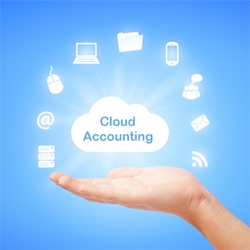
Companies who haven’t made a switch to cloud accounting may wonder if the benefits justify making a change. As more and more people and companies work from a mobile phone or tablet, moving to the cloud is a logical step. Cloud accounting puts crucial elements like corporate documents, CRM, or the accounting system in a private space online so it is fully accessible via a browser or a secure remote connection.
Consider the following benefits of cloud accounting:
- Financial savings due to no costs for version upgrades, system admin costs, maintenance, or server problems. Businesses that go to the cloud typically pay a recurring monthly fee, rather than spending $15,000 or more each time they need to replace their onsite server.
- Anywhere, anytime access to your accounting system. Companies with multiple locations benefit significantly from centralized accounting. Even single-location companies benefit from not being tied to a desk for access to important financial information.
- No more worrying about who has what version and whether the changes the accountant made were updated or applied. There is one central file, and multiple people can be accessing it at the same time. (Each user needs a user license.)
- No more software updates that you have to wait for or apply. This is done by the hosting provider or the SaaS (Software as a Service – more info below).
- Ability to track, manage, and report data in real-time.
- Scalable options mean that companies don’t pay for more than they need, but have the ability to upgrade as needed without interruption to the current system.
- Tighter security for data. Cloud accounting data centers typically have multiple state-of-the-art data security controls and must pass a rigid audit, which is far more protection than any small business can afford to provide for their own data.
- Automatic offsite backup for disaster recovery purposes.
To focus on accounting, by its nature cloud accounting is real-time accounting. At any moment, business owners and managers have actionable financial information, such as:
- Cash flow data
- Profit/loss calculations
- Identification of tax liabilities as well as the ability to reduce or eliminate penalties from paying late or underestimating taxes due
- Error management (before time makes errors worse)
- Ability to capitalize on opportunities that show themselves in the numbers
Three Ways to Be in the Cloud
There are primarily three ways to have an accounting system in the cloud. In order of most expensive and complete, to least expensive and piecemeal:
- Hosted Server Solution
This is the option employed by Lucrum and a couple of our clients. We have elected not to invest in a full server for various reasons, but still want to have a central location to store all files, programs, etc.
Using this option, all company data is transferred to a third party service to reside on either a dedicated or shared server in their data center. As mentioned previously, these data centers typically have much better security and protocols than any small business could afford.
Another benefit of this solution is it allows companies to extend the life of their onsite technology, meaning local computers don’t have to be replaced as often. Also, companies can save money on upgrading programs while ensuring everyone has the same version and platform.
Finally, some hosted server solutions allow companies to offer flexibility in which technology its employees use. It is often difficult to get Mac and PC computers to work seamlessly on a network, using a hosted server solution could alleviate these headaches, while giving employees freedom in an increasing BYOD (Bring Your Own Device) work environment.
- Hosted Cloud Accounting System
This option means that the current desktop software, such as QuickBooks or Sage, does not change. Neither does the company file.
The only thing that’s different once it’s set up is to click a different icon to start the software. After logging in, most everything else is the same. There are a couple of differences in printer access, Microsoft Excel® access, and some of the other interfaces, but it’s essentially the same experience.
So if it’s the same, why move to the cloud? Because it completely eliminates the passing back and forth of the file among users, a CPA, bookkeeper, or anyone else that needs to update or access the accounting file. No more restores. No more DropBox or YouSendIt downloads.
Hosting saves time because the people who have access can login to the file from anywhere.
- Online Accounting System
The third way to have an accounting system in the cloud is to switch to an online accounting system. In industry jargon, this is called SaaS, which stands for Software as a Service. Examples of online accounting systems include QuickBooks Online, Xero, Wave, and Kashoo. These systems have fewer features and will only be right for a client with a need for a simpler accounting system.
Switching from desktop accounting software to SaaS will likely require conversion, setup, and training. It’s a major change.
Concerns
Clients’ two major concerns include security, which is covered above, and costs. When it comes to costs, the most important thing to look at is return on investment. Is saving time of greater value than the costs of hosting or moving to a SaaS? That answer varies for each client.
Please talk with us if you have questions about cloud accounting and how it may work for your business.

I’m On QuickBooks Desktop Pro or Premier…Should I Migrate to QuickBooks Online or Upgrade to QuickBooks Enterprise?
by Debbi Silva If you’re on QuickBooks Desktop Pro or Premier, you’ve likely already heard about Intuit’s plan to phase out the …

Cash Flow Forecasting 101 (and Tips for Organizations Using QuickBooks)
By: Jeff Heybruck Forecasting cash flow is one of the most difficult but impactful planning exercises a business owner can undertake. There …

Small Business Tips to Negotiate Better Payment Terms & Conditions with Customers
By: Jeff Heybruck Net 30? Yeah, right. AR from large clients can be tricky. A common refrain we hear from small business …
